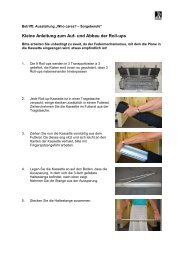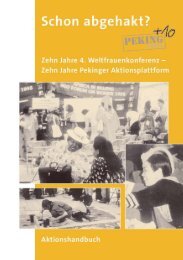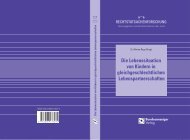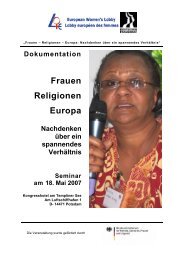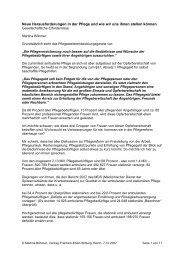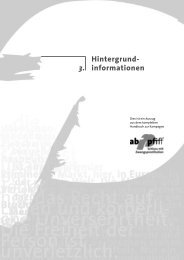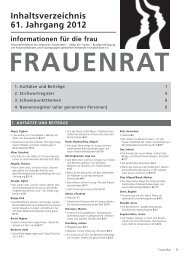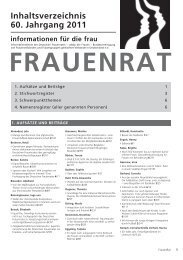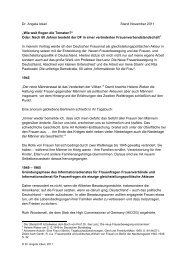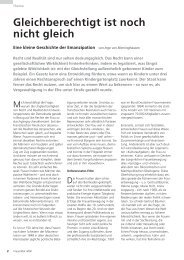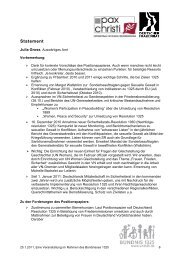Abpfiff - Deutscher Frauenrat
Abpfiff - Deutscher Frauenrat
Abpfiff - Deutscher Frauenrat
Erfolgreiche ePaper selbst erstellen
Machen Sie aus Ihren PDF Publikationen ein blätterbares Flipbook mit unserer einzigartigen Google optimierten e-Paper Software.
Goals and concerns<br />
Human trafficking for the purpose of sexual<br />
exploitation is a serious crime that has developed into<br />
a very lucrative business worldwide – comparable<br />
to the trade in arms and drugs. It takes place in all<br />
societies – including so-called good society. But<br />
it has thus far triggered little public outcry. And<br />
the struggle against it has had little success.<br />
The “Final Whistle“ campaign took the World<br />
Cup as a stage in order to bring the issue to the<br />
attention of the public at large, both at home and<br />
abroad, and to move beyond a mere social policy<br />
agenda. The core of the action was a widespread<br />
Urgent Recommendations of the Campaign<br />
“Final Whistle – Stop Forced Prostitution“<br />
The motto of the 2006 Football World Cup is “A time to make friends“. We in the host country<br />
Germany are hoping to enjoy exciting and fair competition, and looking forward to welcoming<br />
old and new friends from abroad.<br />
At the World Cup, as with similar large-scale events, there will be an increased demand for sex<br />
services. Women's and human rights organisations fear that there will be an increase in human<br />
trafficking as well, for the purpose of sexual exploitation (forced prostitution). Human<br />
trafficking and forced prostitution are major violations of human rights. Those affected, especially<br />
women, suffer physical and psychological violence.<br />
The campaign “Final Whistle – Stop Forced Prostitution“ is using the World Cup as a stage to<br />
increase public awareness of this problem. This campaign is not opposed to legal prostitution. In<br />
fact, existing rights for prostitutes need to be expanded in order to improve working conditions,<br />
to ensure that services are voluntary and independent, and to combat social stigma. We have to<br />
make sure that the human rights of prostitutes are upheld, and that prostitutes themselves are<br />
treated with respect by society at large and by their clients in particular.<br />
Respectful treatment of prostitutes, however, must be combined with resolute measures taken<br />
against forced prostitution.<br />
We therefore urgently recommend<br />
that the German federal<br />
and state administrations do the following:<br />
I. For the countries of origin<br />
■ Provide economic assistance that specifically promotes economic independence for women.<br />
■ Provide sustained support to local human rights groups and civil society in order to ensure<br />
that the following measures are implemented.<br />
■ Promote local counselling and aid projects, and ensure stable coordination among these<br />
groups.<br />
■ Help establish counselling centres and shelters for women and girls affected by sexual<br />
violence and human trafficking, especially in wartorn and crisis regions.<br />
■ Establish and/or support awareness and response strategies among national and international<br />
police and criminal investigation units in these countries.<br />
■ Ensure widespread availability of reliable information about safe and legal immigration<br />
options, as well as about methods used by human traffickers.<br />
sponsored by:<br />
Under the patronage of<br />
Klaus Wowereit, Governing Mayor of Berlin<br />
Dr. Theo Zwanziger, Executive President of the German Football<br />
Federation (DFB)<br />
V.i.S.d.P.: Henny Engels, <strong>Deutscher</strong> <strong>Frauenrat</strong>,<br />
Axel-Springer-Str. 54a, D 10117 Berlin,<br />
Phon: +49 30 204569-0, kontakt@frauenrat.de<br />
signature campaign to support a detailed set of<br />
urgent policy recommendations to combat human<br />
trafficking and forced prostitution. The goal was<br />
to put pressure on policy makers to take stronger<br />
and more successful action against these serious<br />
violations of human and women‘s rights.<br />
The campaign was not directed against football<br />
fans, clients of prostitutes, prostitutes themselves<br />
or prostitution as such. Rather, both initiators and<br />
supporters of the campaign backed the legislation on<br />
prostitution passed in Germany in 2002 that legalises<br />
the sale and purchase of sex services under certain<br />
conditions.<br />
Our urgent policy recommendations<br />
II. For the victims of human trafficking<br />
and forced prostitution in the Federal<br />
Republic of Germany<br />
■ Provide residence permits for a minimum of three months. Victims need this<br />
period to decide whether they are willing to serve as witnesses in legal proceedings. This period<br />
is also needed for stabilization and physical/psychological recovery.<br />
This residence status must contain the following elements:<br />
– It must exclude premature deportation, while ensuring sensitive treatment of potential<br />
victims, providing comprehensive information about their rights in Germany, and arranging<br />
for support from specialised counselling centres.<br />
– It must ensure subsistence and suitable accommodation as well as access to job training<br />
and the labour market.<br />
– It must provide medical treatment and comprehensive therapy options.<br />
– It must include the right to free legal counsel.<br />
■ For those who testify in legal proceedings, residency should be assured regardless of the outcome<br />
of these proceedings.<br />
■ The relevant government agencies must thoroughly investigate each individual case before<br />
deciding on the type of residence permit. Their recommendations must take into account all<br />
possible threats and dangers to the affected persons.<br />
■ Establish binding cooperative agreements between counselling centres and police authorities<br />
in all German states.<br />
■ Provide sustained financial support for these counselling centres as well as the relevant<br />
coordinating bodies, such as the Germany-wide Koordinierungskreis gegen Frauenhandel und<br />
Gewalt an Frauen im Migrationsprozess e.V. (KOK).<br />
III. For the German authorities<br />
■ Ensure that the problem of human trafficking/forced prostitution is a mandatory part of<br />
general education and further training programs. The objective is to make police officers and the<br />
staff of social services departments, immigration offices, and youth agencies aware of the<br />
problem in their treatment of those affected.<br />
■ Establish a sufficient number of special police units staffed by qualified personnel.<br />
■ Strengthen national and international cooperation in combating human trafficking.<br />
■ Establish and/or expand specialised public prosecutors' offices.<br />
■ Enhance awareness on the part of judges by providing targeted information and further edu-<br />
cational programs.<br />
The following organisations support these recommendations:<br />
amnesty international Germany – Germany-wide committee of municipal offices for gender equality and<br />
women's issues – Union of the German Investigative Police (bdk) – German Union of Sex Workers (BSD) –<br />
National Association against Trafficking in Women and Violence against Migrant Women (KOK) – International<br />
Labour Organization (ILO) – National Council of German Women’s Organizations – German Association<br />
of Trade Unions (DGB) – Federal Association of Women's Counselling Programmes and Rape Crisis Centres,<br />
Women Against Violence – Men against Violence by Men – Men’s Work of the Protestant Church in Germany<br />
– Medica mondiale – Ecumenical Forum of European Christian Women, German Section (ÖFCFE)



